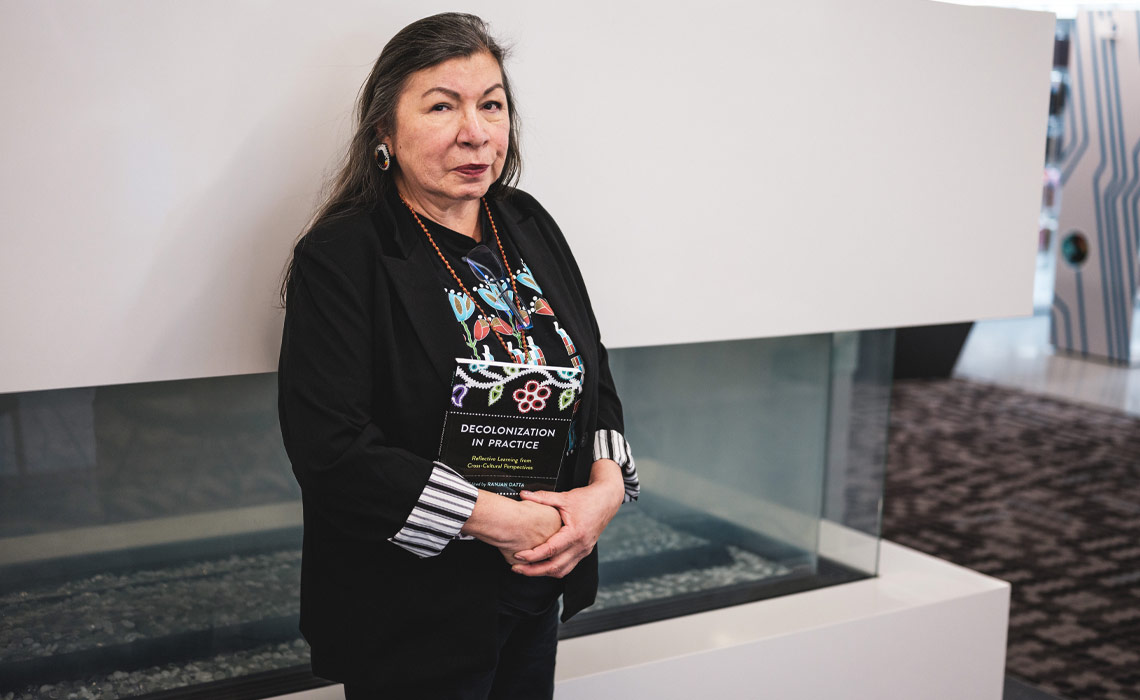New cross-cultural collection focuses on moving past talk with decolonization

“I have struggled with my own Indigeneity for most of my life. In high school I would often joke that if something went wrong, it was because I was native. I was never comfortable with being Indigenous for various reasons. For instance, I went to a white school and grew up in a white neighbourhood; I never had a lot of interaction with Indigenous people. I was always the tanned kid in school and when people would guess my nationality, I would always get Mexican or Greek.
Growing up as a tanned kid in a white neighbourhood is quite easy when nobody knows that you are Indigenous. Maybe in the back of my mind I knew it would be easier for me to not admit that I was an Indian kid so white people would accept me.
Throughout my teens, I acted “white.” I would get uncomfortable when someone would bring up that I was Indigenous and downplay it or avoid the topic altogether, in fear that I would be looked at differently because the secret would be out.
This is what colonization had already done to me at a very young age. My formative years were spent downplaying that I was Indian. It seemed like the settlers’ demand for assimilation had worked.”
— Ryan Whitford, MRU student and contributor to Decolonization in Practice: Reflective Learning from Cross-Cultural Perspectives
Decolonization is a shared responsibility but people approach it from unique perspectives.
And many struggle to understand it goes beyond simply talking about it, says Dr. Ranjan Datta, PhD, Mount Royal University’s Canada Research Chair in Community Disaster Research.
Instead, he says, decolonization is a process that informs how one lives their life, connects to the land and builds communities that embrace anti-racist ways.
Datta concedes he had to unlearn old ideas to better comprehend it all.
Several years after the Bangladesh-born, racialized immigrant moved to Canada in 2009, scholars and researchers were talking about decolonization — most typically, as something token or something understood at a very abstract level.
He says many people struggled to comprehend what it really meant.
And few recognized the call to action that comes with it.
“They had taken a course, done some work on the topic and figured they were done,” Datta says. “But it’s a process. It doesn’t just happen within one course.”
That said, everyone starts from a different vantage point.
Dr. Jebunnessa Chapola, PhD, is a community activist, anti-racist, decolonial feminist scholar and an academic mother of three.
“I believe storytelling is powerful,” she says.
And Chapola, a Social Sciences and Humanities Research (SSHRC) post-doc at the University of Regina and a contract faculty member with MRU’s Department of General Education, has one of her own.
As a Muslim, she faced backlash for marrying Datta, who is a Hindu. Even after relocating to Canada they were subjected to racism by many in the Bangladeshi-Canadian community.
More than a decade ago, Chapola set her sights on becoming a community builder, advocating for others and taking on the lifelong journey of an anti-racist. Leading a community garden in Saskatchewan proved a powerful way to connect with the land and build relationships with Indigenous and non-Indigenous communities.
“Our community garden is a place for relational networking, connecting with community needs, and creating belongingness within the land,” she says.
Chapola says one of the first steps of decolonizing is learning our responsibility to the land at a time when it and humans have become so disconnected.
“Land is my body, we need to take care of our body,” she says.
She is one of more than a dozen contributors to Decolonization in Practice: Reflective Learning from Cross-Cultural Perspectives, a newly released collection edited by Datta.
It offers input from the Indigenous and Black communities, racialized immigrants, refugees, scholars, researchers and practitioners as well as activists and settlers.

Many voices in the compilation, (including Karen Pheasant-Neganigwane, Kristie Billard, Priyanka Mahey, Najla Mohammadi and John Bosco Acharibasam) are MRU faculty, alumni or students.
Anti-racism community builder Rhonda Rosenberg is among those sharing experiences. She wrote about a project stemming from an ugly incident at a Regina Canadian Tire. In that case, a First Nations gentleman named Kamao Cappo was accused of stealing and kicked out by an assistant manager during an incident Cappo alleged was racial profiling. The Saskatchewan Human Rights Commission would eventually agree.
The franchise owner would take the opportunity to use the incident as a learning opportunity, however. Rosenberg says the treatment of the Indigenous man paved the way to looking at systemic racism not only at that store, but to the development of a video workshop for business audiences to learn about racial profiling, especially as it impacts Indigenous Peoples. The workshop then helps businesses implement their own action plans for change.
“Each of us has lifelong work with internalized racism to question our thoughts, feelings and assumptions about people in groups to which we belong and ‘others,’ ” she writes. “This transformational journey can shed light on all levels of racism, including systemic racism in the places we work, educational institutes, businesses we go to, and community organizations.”
Datta, an assistant professor of Indigenous studies in the Department of Humanities, hopes the collection is an interdisciplinary handbook of sorts for students at all levels offering real-life stories that motivate and inspire action.
“Decolonization in practice teaches us that (it) is not a trend or a box to be ticked; it’s not a single gesture, action, or statement; it’s not about blame or guilt; and it’s not someone else’s responsibility,” he says. “Decolonization in practice helps us to relearn how to live together, how to respect each other, how to protect each other’s rights, how to create belongingness with the land and people, how to take responsibility, how to protect Indigenous land rights, how to speak up against injustice, and how to protect land and water.”

